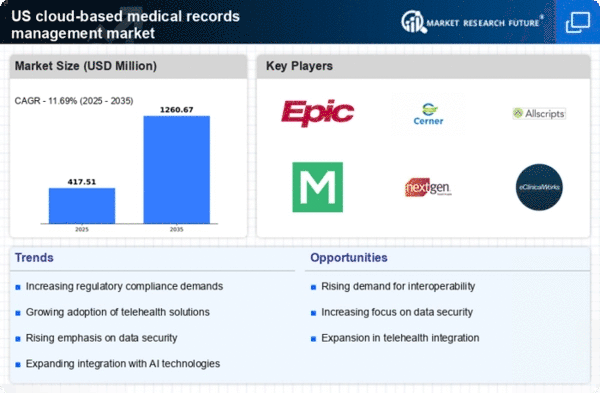The cloud based-medical-records-management market is currently characterized by a dynamic competitive landscape, driven by technological advancements and an increasing demand for efficient healthcare solutions. Major players such as Epic Systems Corporation (US), Cerner Corporation (US), and Allscripts Healthcare Solutions (US) are at the forefront, each adopting distinct strategies to enhance their market positioning. Epic Systems Corporation (US) focuses on innovation through continuous software updates and user-friendly interfaces, while Cerner Corporation (US) emphasizes strategic partnerships to expand its service offerings. Allscripts Healthcare Solutions (US) is actively pursuing digital transformation initiatives, aiming to integrate AI and data analytics into its platforms, thereby enhancing patient care and operational efficiency. Collectively, these strategies contribute to a competitive environment that is increasingly centered around technological innovation and customer-centric solutions.
In terms of business tactics, companies are increasingly localizing their operations to better serve regional markets, optimizing supply chains to enhance efficiency, and investing in research and development to stay ahead of technological trends. The market structure appears moderately fragmented, with several key players exerting considerable influence. This fragmentation allows for a diverse range of solutions, catering to various healthcare providers' needs, while also fostering competition that drives innovation.
In October 2025, Epic Systems Corporation (US) announced a significant partnership with a leading telehealth provider to integrate remote patient monitoring capabilities into its electronic health record (EHR) system. This strategic move is likely to enhance patient engagement and streamline care delivery, positioning Epic as a leader in the evolving landscape of telehealth integration. The partnership underscores the importance of adaptability in the current market, as healthcare providers increasingly seek comprehensive solutions that encompass both in-person and virtual care.
In September 2025, Cerner Corporation (US) launched a new AI-driven analytics tool designed to assist healthcare providers in predictive modeling and decision-making. This tool aims to improve patient outcomes by leveraging data to identify potential health risks before they escalate. The introduction of this technology reflects Cerner's commitment to innovation and its strategic focus on enhancing the capabilities of healthcare providers through advanced analytics.
In August 2025, Allscripts Healthcare Solutions (US) expanded its cloud-based platform to include enhanced interoperability features, allowing for seamless data exchange between different EHR systems. This development is crucial as it addresses a longstanding challenge in the healthcare sector, where data silos can hinder effective patient care. By prioritizing interoperability, Allscripts positions itself as a facilitator of integrated healthcare solutions, which is increasingly demanded by providers and patients alike.
As of November 2025, the competitive trends in the cloud based-medical-records-management market are heavily influenced by digitalization, sustainability, and the integration of AI technologies. Strategic alliances are becoming more prevalent, as companies recognize the need to collaborate to enhance their service offerings and address complex healthcare challenges. Looking ahead, competitive differentiation is likely to evolve, shifting from traditional price-based competition to a focus on innovation, technological advancements, and supply chain reliability. This transition suggests that companies that prioritize these areas will be better positioned to thrive in an increasingly competitive landscape.

















